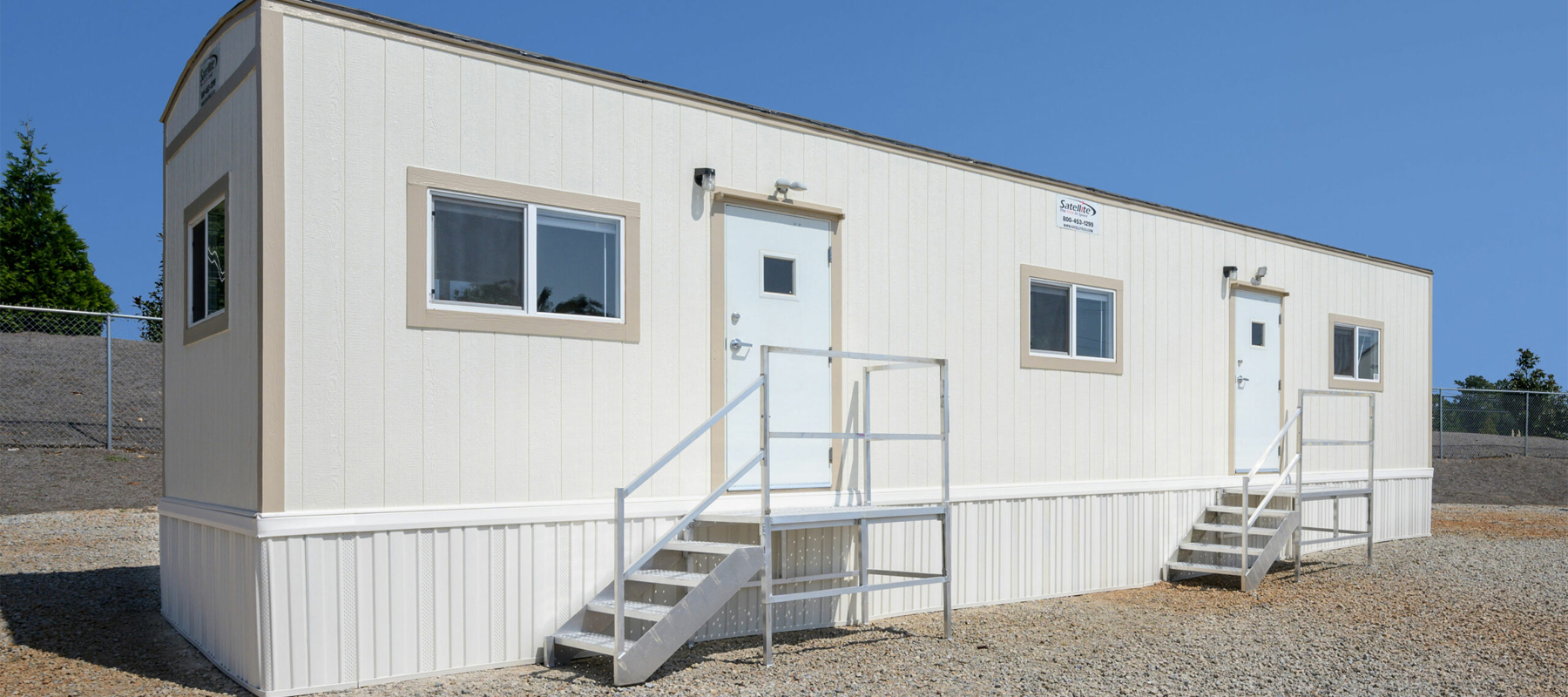How Much Does a Mobile Office Rental Cost?
Last Updated: January 04, 2023

Fact Checked By: Ryan Maguire
On This Page
Renting or leasing a mobile office trailer is a fast and affordable way to create or expand your office space quickly. Mobile office trailers are pre-manufactured off-site, so they're ready to go as soon as you need the extra space.
Mobile office trailers are used in a variety of industries. They are particularly popular for construction sites and other locations where building a permanent structure doesn't make sense. They're also commonly used as portable classrooms when schools are overcrowded but can't afford to expand or rebuild.
Mobile office trailers are available for rent in a variety of sizes. They solve temporary space needs for anything from small businesses to large corporations. They are leased on a monthly basis, usually for anywhere from $100 to $500, depending on size.
Average Costs to Rent or Lease a Mobile Office Trailer #
The mobile office trailer business is largely seasonal. Spring and summer are the busiest times, so prices are higher during those seasons. However, the most significant factor in determining price is the size of the trailer.
Common Mobile Office Trailer Sizes #
- Small trailers, generally 8' X 20', usually cost $300 to $500 per month
- Mid-sized trailers, often 10' X 40', run $400 to $600 per month
- Large single-wide trailers in the standard 12' X 60' size range from $700 to $900 per month
Rental rates for mobile office trailers also vary by region, as with most goods and services. Leasing a mobile office trailer is more expensive on the east and west coasts, less expensive in the Midwest and the least expensive in southern states.
In addition to a monthly fee, you'll also have to pay for delivery, setup, and removal. Budget about $1,000 to $1,500 for delivery and setup, and another $300 to $1,000 for removal. Some dealers charge extra for accessories like steps leading up to the trailer door or a skirt to hide the wheels, while others include those accessories in the monthly fee. If they're not included, plan on spending $20 to $50 a month for each set of steps. There is an average flat fee cost of $500 to $800 or more for the skirt.
Large trailers often come equipped with bathrooms, which is particularly handy if they're located on a remote site or the mobile office is a long walk from the main building. You can connect the bathroom to city water and sewer, but that requires hiring a plumber for an additional cost of about $200 to $400.
Renting vs. Buying a Mobile Office Trailer #
Mobile office trailers are not designed to be a permanent solution for space needs, so leasing makes up the vast majority of the market. A construction company might need a mobile office for six months while building a subdivision or a school district might need one for the entire school year.
Buying a mobile office trailer is a major investment. A mobile office that costs $200 to $500 per month to rent could retail for $20,000 to $30,000. The cost of leasing that office for a year would be $3,600 to $4,500, not including delivery, setup and removal. So, unless you anticipate using the mobile office trailer for many years or moving it from site to site, leasing is almost always more economical.
Keep in mind that most dealers have at least a three-month minimum. And many will offer discounted rates for long-term leases of one year or more.
Factors that Help Determine Office Trailer Size #
The size of your office trailer is one of the most important decisions you have to make. To ensure you get a properly sized unit, you need to consider how long you'll be using it, the number of people that will occupy it, how much space you have for the trailer, and what exactly you plan to use it for.
Start by answering the following questions:
- How long will you use the unit? The amount of time you plan to use the trailer is important. If you don't plan on using the office trailer for a long time or will be moving it between locations, it is probably best to pick one on the smaller size for easier transport. But, if you plan to keep it around for a while, it might be better to choose a larger unit that has the traditional conveniences.
- How many people will use the trailer? The general rule of thumb is to have 100 to 150 square feet of space per person.
- How big is the space for the trailer? The available space where you plan to place the office trailer matters. Make sure that you have enough room for the trailer to be delivered and set up, and that it won't take too long to tear down.
- How will the office trailer be used? Think about how the office trailer is going to be used. Office trailers are used across a variety of industries, including construction, education, and manufacturing. Figure out what purpose you want the trailer to serve. This helps you figure out how many people will be working in it and how long you need to have it.
- What about utilities? You also need to consider power sources and exactly what you need for the trailer. Be sure to talk to your utility company about any electricity, water, or other utilities you need.
What Are Office Trailer Size Options? #
Mobile office trailers are typically broken down into three categories:
Single-wide: The most common of the office trailer types, single-wide trailers measure 14' wide or less. These are generally used as space for a single office with a small storage area, or as a setup for two smaller offices.
Double-wide: Measuring in at 24' wide, double-wide office trailers are usually two single-wide units that have been welded together and have up to four separate areas. It is not uncommon for double-wide trailers to have a break area and kitchen.
Triple-wide: The least common type of office trailer, triple-wide units measure around 42' wide. Made from three single-wide units welded together, triple-wide office trailers are often delivered as separate units and then assembled on-site.
Prepping for Delivery of Your Mobile Office #
Whether you're renting a mobile office trailer or moving one you already own, you must first ensure the site is ready for delivery. If you're renting, the vendor may send an inspector to determine whether the ground is level. However, ask your supplier to be sure, as the responsibility may fall on you.
If you're doing it yourself, start preparing the site by removing any debris or vegetation from the area. And don't forget to look up; overhead branches and utility wires may cause an issue if they're too low. Determine your office trailer's dimensions to ensure you have adequate space.
For reference, this is the amount of clear space you'll need for a standard 40' office trailer:
- 20' vertically, for the office itself
- 12' horizontally, for the office itself, plus an additional 5' for maneuvering the trailer into position
- Around 100' to 120' for the trailer making the delivery
In addition, the ground needs to support the trailer delivering the mobile office. Typically, these vehicles weigh in at around 30,000 pounds. A stone-paved surface is best, but asphalt, cement, and gravel should also work.
If your site has a soft surface, such as grass or loose soil, you need to prepare it to handle the weight of your mobile office trailer without sinking. You may place your trailer on top of piles of hardwood or railroad ties. You may also lay down asphalt paving or a bed of concrete or gravel.
Additional Site Prep Considerations for a Mobile Office Trailer #
Requirements vary by state and county, so check the building codes and zoning requirements in your area. For example, you may need concrete footers for a mobile office trailer. You can find this information on your state government's website, but you can also talk to your vendor.
The site needs to be staked and marked for utilities, as well, with hookups that comply with local regulations. This needs to occur before delivery.
Finally, you must make the site accessible for employees, visitors, vendors, etc. This includes space for parking and a driveway that can accommodate deliveries (such as of the trailer itself). Don't forget ADA requirements, such as handicap-accessible ramps.
Resources:
